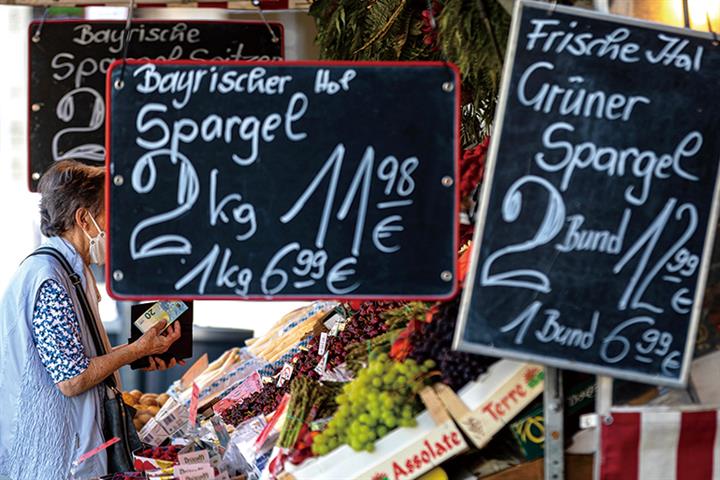 A Western Recovery Built on Sand
A Western Recovery Built on Sand(Yicai Global) June 15 – Monday America’s Nasdaq 100 stock index crashed by 4%, officially entering “bear market” territory. The crash has wiped out over 25% of its value in the space of a year, as mounting global uncertainties which include higher than expected inflation (8.6% year on year in May), surging fuel and commodity costs, and growing anticipations that interest rates will continue to be hiked up. Hours before the downfall, it was announced that the British economy had contracted by 0.4% across the past month, illustrating the growing change of fortunes in the west following a year of recovery.
Yet Boris Johnson’s government, as well as Joe Biden’s across the Atlantic, have in rhetorical practice been firmly dismissive of these mounting problems, having continually and repeatedly boasted in the proclaimed strength of their economic recoveries. Only a week ago the President proclaim: “The fact is America is in a stronger economic position today than just about any other country in the world” and baselessly claimed, “the U.S. economy could grow faster than China’s economy this year”- statements which do not stand up to scrutiny.
At this point, it is quite clear, that whilst new uncertainties have undoubtedly come into the mix, the western economic recovery from the covid-19 pandemic has been built on sand and has been a “quick fix” set of solutions that pursued short-term goals in disregard of long-term consequences that were subsequently heralded as a policy vindication by respective leaders. None of it has aged well. An overheating of the money supply, artificial inflation of markets, combined with geopolitical adventurism and ideological chauvinism have all proven to be a toxic formula that has created runaway inflation and ever-growing risk of recession.
Over the past few months, China’s Zero-covid policies come increasingly under fire by western media commentators who believed that nations such as Britain and America had found a better way: that being to disregard restrictions altogether. Disregarding unpopular, yet necessary, pandemic restrictions for populist purposes, western leaders opted to inject trillions into their economies on the grounds they could force things back to normal under the name of “living with covid” and arguing (as per Biden’s comments above) that it would allow them to outflank China who maintained a strict approach. Britain’s health-minister Sajid Javid directly attended the Shanghai lockdown on Twitter, and even personally proclaimed Britain a “leader”.
However, irrespective of pandemic questions, these short-sighted economic policies are ending in disaster. The statistics of GDP “bounce-backs” from covid and the political cheerleading attached to them overlook the fact that western economies going into the pandemic were not particularly strong as it is, especially in Europe and Britain (the latter being impacted by Brexit). By injecting extreme amounts of stimulus in the bid to artificially and excessively inflate growth, whilst also maintaining minimum interest rates, what western nations have done is dramatically overheating the money supply and creating extreme levels of inflation as economies wrestled with booming demand but also revenue losses simultaneously.
As a result, countries are now being forced to end these policies prematurely and in some cases, before covid recovery trajectories are even complete (such as Britain), accumulating in interest rate rises that were effectively unplanned and will have a deeper detrimental effect on growth. Although the US federal reserve has repeatedly claimed the economy will have a “soft landing” (despite misleadingly saying inflation was transitionary for a year) the reality is it will be a turbulent one. The U-turn in liquidity policy has already forcibly exposed and burst the stock bubble which was being built up over the past year wherein the Federal Reserve artificially inflated stocks to prop up investor confidence.
Finally, western geopolitical decisions leave much to be desired. The decision to confront Russia over Ukraine and provoke a conflict, combined with sanctions pledged to “cripple Putin’s war machine” have all dealt serious damage to critical energy and food supply chains which have tipped the fulcrum from post covid inflation turbulence, to seemingly a new recession. In conjunction, many Anti-China policies pushed by the US, most specifically trade war tariffs and absurd protectionism, as well as the escalation of tensions and uncertainties, have made matters worse. An already fragile global economic environment was not ready for such large-scale disruption, wherein the foundations of post-war peace and stability are upended more so than ever. Hard times are ahead as leaders bear the consequences of impulsive, ideological, and populist decision-making.